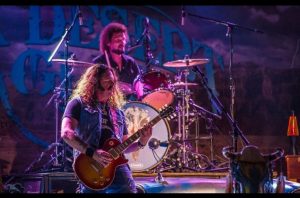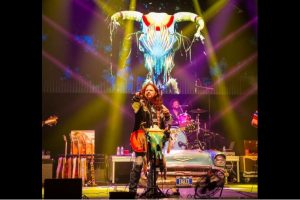
Posted Jul 28, 2019 at 2:47 PM
Link to article: HERE
“Are you ready to party like it’s 1977?” Pat Badger asked, and the 1,200 Eagles fans at the South Shore Music Circus in Cohasset roared their assent.
Saturday night the venerable Cohasset tent hosted Dark Desert Eagles, the tribute act Badger founded a couple years ago, and they delivered two 55-minute sets comprising most of the real Eagles’ mega-hits from their career’s zenith, roughly 1971 to ’77, along with a couple cool surprises.
Eagles tribute acts seemed to proliferate around the time their reunion tours were setting new records for highest ticket prices. Of course there’s nothing like seeing and hearing the real thing, but maybe not if a second mortgage is required to get good seats. And since the 2016 death of lead singer/guitarist/songwriter Glenn Frey, many of the band’s fans don’t feel it’s the same, although we must say Vince Gill and Frey’s son Deacon Frey, who the band replaced him with, would seem to be topnotch substitutes. It’s also worth adding that the latter day reunion tours have included five added musicians, so the 10-piece Eagles taking the stage in late September at the MGM Grand In Las Vegas (performing the “Hotel California” album in its entirety) is not exactly the original quintet anyway.
Badger is an Eagles fan, and he was especially upset at Frey’s death and the prospect of not hearing those songs Frey sang again. Boston area rock fans might know Badger as the bassist in the band Extreme, the glam-rockers out of Malden, who sold millions of records in the late-1980s/early 1990s. Badger formed his own Eagles tribute act, and enlisted Kevin Figueirido, Extreme’s drummer since 2007. Berklee College of Music professor Tom Appleman came aboard as bassist, since Badger would be taking over Frey’s lead vocalist/guitarist role. Eric Clemenzi joined in the guitarist role filled by Bernie Leadon up to′74, and Don Felder after that. And Chris Lester became the Joe Walsh character, providing guitar, keyboards and vocals, as the real Walsh did after ’75.
It was quickly apparent Dark Desert Eagles have gone all in with their wardrobe, stage set, and approach. Lester had a kerchief holding his hair in place, a la Walsh, while Clemenzi mimicked the band’s penchant for wearing sports jerseys by wearing a classic Patriots Steve Grogan uniform top. Badger, dressed something like Frey in laidback California cowboy/poet gear, delighted in staying in character, introducing the songs and his bandmates as if they were in fact the authentic band. They did, however, seem to have comical name switches, so that Badger became “Glenn Spry,” and Lister was “Faux Walsh,” and Appleman’s Randy Meisner role became “Randy Budweiser.”
The middle of the stage was marked by the front end of a 1957 Chevy, and various decorations evoked the images of the Eagles’ Western themed music.
Musically the band was well-rehearsed and tight, without seeming the least bit studied or too stiff — they seemed to be having fun onstage. One wrinkle that was the occasion for some lengthy setups was that Badger sang almost all the leads, since drummer Figueirido lacks Don Henley’s vocal chops, and Appleman likewise couldn’t hit Meisner’s high notes on his signature song, “Take It to The Limit.” But the good news vocally was that Badger’s voice is just about in the sweet spot between Frey and Henley, so that he could sing all these songs and they were not just believable, but musically spot-on. The other musicians, except for the drummer, added fine three-and-four part harmonies to many tunes.
The first set began with a fast-paced “Life In the Fast Lane” and moved easily into the soaring vocal harmonies of “Already Gone,” where Clemenzi’s guitar solo was perhaps a bit jazzier than the original. Badger as Frey dedicated the next song to “two of my three ex-wives,” and “Witchy Woman” was every bit the mysterious, Southwest-evoking mood piece it should be. Lister stepped forward to sing lead as Walsh on “In the City.” That was a good moment to remember how much funkier that tune was than most Eagles material, and also how much wilder and squallier Walsh’s guitar solos are than the normal Eagles ones, and Lister embodied that to perfection.
Clemenzi’s scorching guitar solo highlighted “One of These Nights,” where Badger proved he can handle the falsetto vocal the tune demands. Badger played acoustic guitar as the band did a stellar job on two of the more subtly entrancing songs, “Peaceful Easy Feeling” and “Lyin’ Eyes.” With tongue firmly in cheek, Badger showed a vinyl copy of “our brand new album,” holding “Hotel California” aloft, and suggested fans run down to their local “record store, or maybe Bradlees” to get a copy. After a bracing turn through “New Kid In Town,” the first set ended with Lister-as-Walsh singing the crunchy rocker “Rocky Mountain Way.”
The second set opener was “Desperado,” and with much of the crowd filtering back into the arena, things were a bit chatty during perhaps the quietest song of the night, so we might suggest shifting that order around. For that song, Badger had been in cowboy hat and serape, playing acoustic guitar, which he also utilized on a sterling “Tequila Sunrise.” Lister came back to the fore for a muscular run through Walsh’s signature song, “Life’s Been Good,” to a big crowd response.
Badger did a bit with Appleman, about his reluctance to sing “Take It to the Limit,” due to a cold (an incident based on the real Eagles’ history), and then played a tape of another bassist sweetly singing “Tell My Why,” (Timothy B. Schmit, who did in fact replace Meisner in ’76). The band’s version of “Hotel California” was outstanding, with Clemenzi playing a double neck (12 and six-string) guitar, as his textured solo led to Walsh’s, and then into the fiery unison finish. The audience erupted in cheers after that one — and the twenty-somethings who’d been dancing in the aisle next to me finished cheering, and then left, apparently having heard what they’d come for.
But the Dark Desert Eagles were far from finished, and a dazzling four-part vocal harmony take on “Take It Easy” helped turn the big tent into a massive singalong choir. Probably the best surprise of the night wasn’t even, per se, an Eagles song, but a Walsh tune from his days with The James Gang, and again “Funk #49″ proved that adding Walsh brought more funk and more rock edge to the Eagles than they’d had before him. The night ended in a long, extended, sing/clap-dance-along to “Heartache Tonight,” when the putative party from 1977 had climaxed, and those musicians from Beantown had successfully captured the essence of rock’s quintessential California band.